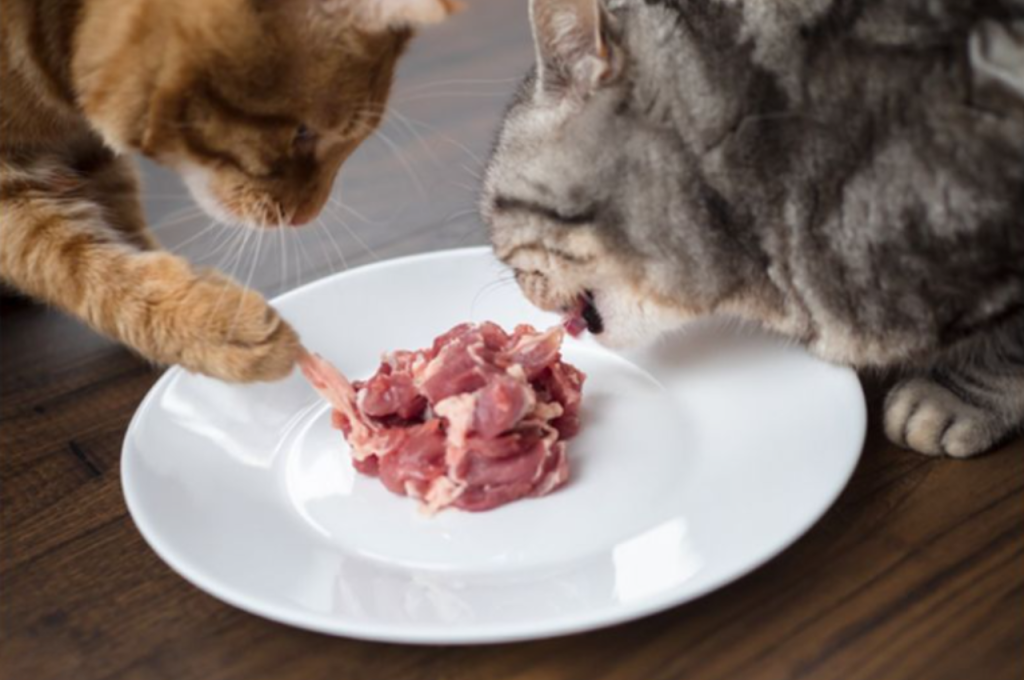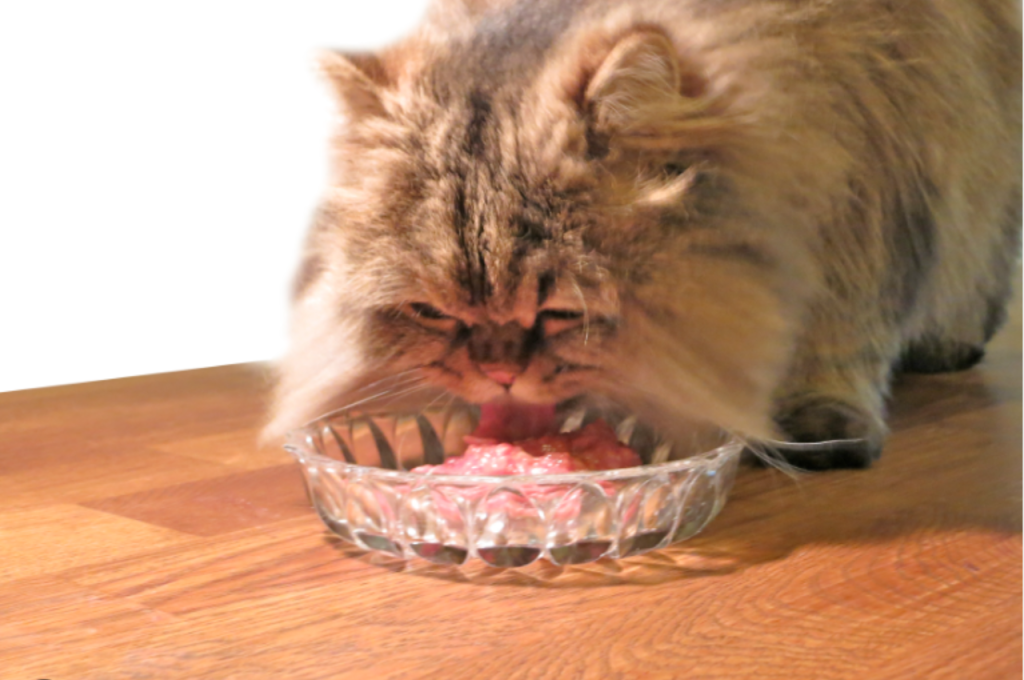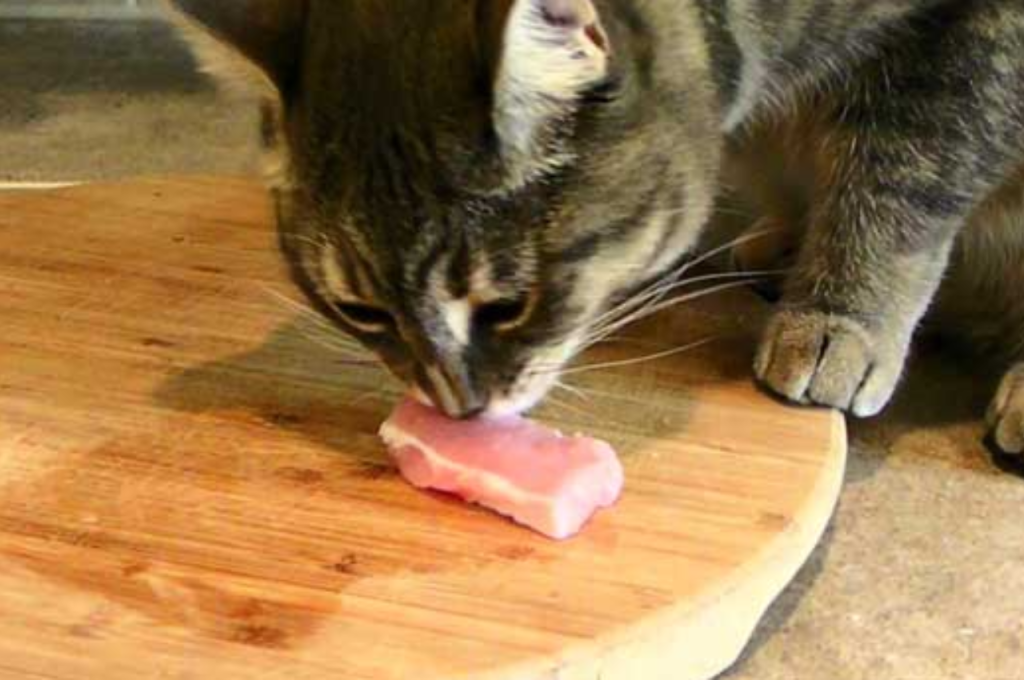Feeding cats a diet of 100% meat is not necessarily good for their overall health. Cats are obligate carnivores, meaning their bodies are designed to thrive on a diet primarily consisting of meat.
While lean protein from meat is essential for their well-being, a 100% meat diet may lack certain nutrients that are crucial for cats’ optimal health. Providing a balanced diet that includes other necessary components like vitamins, minerals, and taurine is vital.
By offering a variety of meat sources and incorporating other essential ingredients, cat owners can ensure their feline companions receive a well-rounded diet that meets all their nutritional needs. While meat is important for cats, it is important to remember that a balanced diet is essential for their overall well-being.
The Concept of a 100% Meat Diet for Cats
When it comes to the diet of our beloved feline friends, there has been a growing trend towards feeding them a 100% meat diet. The concept behind this approach is based on the idea that cats are obligate carnivores, meaning they require a diet that is primarily composed of meat. But is a 100% meat diet the best option for cats?

Benefits of A Meat Diet
A meat-based diet offers several potential benefits for cats:
- Enriched Nutrition: Meat is a rich source of essential nutrients such as protein, vitamins, and minerals that are vital for a cat’s overall health and well-being.
- Promotes Healthy Weight: Cats thrive on high-protein diets, and a meat-based diet can help them maintain a healthy weight by providing them with the energy they need and reducing the risk of obesity.
- Supports Muscle Development: The high protein content in meat helps support muscle development and maintenance, ensuring that cats stay strong and agile.
- Improved Digestion: Cats have a short digestive tract designed to digest and absorb nutrients from animal protein efficiently. Feeding them a diet rich in meat can lead to improved digestion and nutrient absorption.
- Enhanced Coat and Skin Health: A meat diet can contribute to a lustrous coat and healthy skin in cats, thanks to the presence of essential fatty acids.
Potential Drawbacks of an Exclusively Meat Diet
While a 100% meat diet may offer many benefits, there are also potential drawbacks to consider:
- Nutritional Imbalances: Relying solely on meat for a cat’s diet may result in nutritional imbalances, as it might lack essential vitamins, minerals, and other nutrients.
- Dietary Restrictions: Feeding a 100% meat diet can be challenging due to dietary restrictions, especially for owners who prefer a more varied and convenient approach to cat nutrition.
- Potential Allergies: Some cats may develop allergies or sensitivities to certain types of meat, which could pose a problem if they are solely reliant on this food group for sustenance.
- Financial Considerations: A meat-based diet can be more costly than other cat food options, especially if purchasing high-quality, human-grade meats.
- Increase in Environmental Impact: Feeding cats a 100% meat diet can contribute to a higher environmental impact due to the resources required to produce and process meat-based pet foods.
Nutritional Needs of Cats
Nutritional needs of cats form the cornerstone of their health and well-being. Understanding the dietary requirements of cats and ensuring they receive a well-balanced diet is crucial for their overall health.
Understanding Cat’s Diet Requirements
Cats are obligate carnivores, meaning they require a diet primarily composed of animal-based proteins. Their nutritional needs are distinct from other animals, necessitating a focus on high-quality protein sources.
Balancing Essential Nutrients
Essential nutrients, including vitamins, minerals, and amino acids, are vital in meeting a cat’s dietary requirements. Crafting a balanced diet ensures cats receive the necessary nutrients for optimal health and longevity.
Exploring Different Types of Meat for Cats
When it comes to feeding our beloved feline friends, choosing the right type of meat is essential for their health and well-being. Cats are obligate carnivores, which means they require a diet consisting mainly of meat to thrive. But what are the best options when it comes to feeding your cat? In this article, we will delve into the world of different types of meat for cats, exploring the benefits and considerations of lean meats versus organ meats, as well as the pros and cons of raw meat versus cooked meat. So, let’s get started!
Lean Meats vs. Organ Meats
When it comes to lean meats, options like chicken and turkey are excellent choices for your cat’s diet. These meats offer a high protein content that is essential for maintaining strong muscles and supporting overall growth and development. In addition to protein, lean meats also provide important nutrients such as vitamin B12, iron, and zinc. However, it’s crucial to ensure that the lean meats you offer your cat are boneless and skinless, as bones can pose a choking hazard and excess fat can lead to weight gain.
On the other hand, organ meats like liver, heart, and kidney can be incredibly beneficial for your cat. These organs are rich in essential vitamins and minerals that are vital for your cat’s overall health.
For instance, the liver is an excellent source of vitamin A, which is crucial for maintaining healthy vision and a strong immune system. Organ meats contain high levels of taurine, an amino acid that is essential for cats as they cannot produce it naturally. While organ meats offer numerous health benefits, it’s important to feed them in moderation and ensure they are fresh and properly prepared.
Raw Meat vs. Cooked Meat
Raw meat has gained popularity among some cat owners due to its perceived benefits, such as providing a diet similar to what cats would eat in the wild. Advocates of raw meat feeding claim that it improves digestion, promotes healthier coats, and increases energy levels in cats. However, it’s important to understand that there are risks associated with feeding raw meat. Raw meat can contain harmful bacteria and parasites that can cause foodborne illnesses in cats.
Moreover, preparing a balanced raw meat diet can be challenging, as it requires careful consideration of the appropriate nutrient ratios. Consulting with a veterinarian is essential if you choose to feed your cat a raw meat diet.
Alternatively, cooked meat is a safer option as it eliminates harmful bacteria and parasites that may be present in raw meat. Cooking also helps break down the proteins in meat, making it easier for cats to digest. It’s important to avoid seasoning the meat with any additives like salt, onions, or garlic, as these can be toxic to your cat. When cooking meat for your cat, it’s best to boil or bake it without any seasoning, ensuring it is thoroughly cooked and cooled before serving.
Pros and Cons of A 100% Meat Diet
Cats are obligate carnivores, meaning their diet mainly consists of meat. The debate about whether a 100% meat diet is good for cats is ongoing. Let’s explore the pros and cons of a diet exclusively consisting of meat for our feline friends.

Advantages of Meat Diet
A 100% meat diet for cats has several advantages:
- Meat provides essential nutrients like taurine and arginine, which are crucial for a cat’s health.
- High protein content in meat aids in muscle development and maintenance, providing energy for their active lifestyle.
- Minimal processing ensures the preservation of natural nutrients, promoting overall well-being.
Disadvantages of an Exclusively Meat Diet
While a 100% meat diet offers benefits, there are also some drawbacks to consider:
- Lack of essential nutrients: Exclusively feeding meat can lead to deficiencies in vital vitamins and minerals unless supplemented properly.
- Digestive issues: Some cats may struggle with digesting an exclusively meat-based diet, leading to gastrointestinal problems.
- Cost and availability: Quality meat can be expensive, and it may not always be readily available, making it challenging to maintain a consistent diet.
Transitioning to A Meat Diet
While cats are obligate carnivores, a complete meat diet may lack essential nutrients. It is advisable to consult a veterinarian for the best diet plan for your feline friend.
To transition a cat to a meat diet, gradual changes are essential. Introduce meat in small increments over some time to avoid digestive issues. Consulting a Vet Before transitioning, consult a vet to ensure the safety and appropriateness of the new diet. Vets can provide guidance tailored to the specific needs of the cat.
Alternative Diet Options for Cats
When it comes to feeding our feline friends, many cat owners wonder if 100% meat is good for their cats. While meat is a crucial part of a cat’s diet, it’s important to consider alternative diet options that provide a well-rounded nutritional balance. In this article, we will explore different approaches to cat nutrition under the subheading:
Alternative Diet Options for Cats
If you’re considering alternative diet options for your cat, commercial cat food is a popular and convenient choice. These pre-packaged cat foods are formulated to meet the nutritional needs of cats and often contain a variety of ingredients to ensure a balanced diet. From proteins to vitamins and minerals, commercial cat food aims to provide all the essential nutrients your cat needs to thrive.
Here are some key benefits of feeding your cat commercial cat food:
- Convenience: Commercial cat food eliminates the need for meal preparation, making it a time-saving option for busy cat owners.
- Nutritional balance: With a wide range of formulas available, commercial cat food is designed to provide the necessary nutrients in the right proportions.
- Special dietary needs: Certain commercial cat foods cater to specific dietary requirements, such as hypoallergenic diets or weight management formulas.
While commercial cat food is a convenient option, it’s important to look for high-quality brands that prioritize real meat as the primary ingredient. Read the labels and avoid products with excessive fillers, artificial preservatives, or unhealthy additives that might compromise your cat’s well-being.
If you prefer to provide your cat with fresh meat but still want to ensure they receive a balanced diet, combining meat with commercial cat food can be a viable option. This approach allows you to incorporate the benefits of raw or cooked meat while ensuring your cat gets all the necessary nutrients from a commercial cat food source as well.
Here are some ways to combine meat with commercial cat food:
- Raw Meat Treats: Offer small portions of raw meat as treats or additions to your cat’s diet, keeping in mind that certain meats may require cooking to eliminate the risk of bacterial contamination.
- Home-Cooked Meals: Prepare homemade meals that include cooked meat along with other cat-friendly ingredients. Ensure your homemade meals provide a balanced combination of proteins, vegetables, and essential nutrients.
- Mixed Feeding: Mix small portions of freshly cooked or raw meat with your cat’s regular commercial cat food to add nutritional variety to their diet.
- Supplements: If you choose to provide homemade meals or raw meat, consider consulting your veterinarian about additional supplements to ensure your cat receives all the necessary nutrients.
Combining meat with commercial cat food allows you to provide your cat with the benefits of fresh meat while ensuring they receives a well-rounded and balanced diet. Remember, it’s important to consult with your veterinarian before making any drastic changes to your cat’s diet, especially if your cat has any specific dietary requirements or health concerns.
Health Effects of Meat Diet On Cats
Cats thrive on a diet rich in meat, but is 100% meat good for them? Let’s delve into the health effects of meat diets on cats to understand the impact on their overall well-being.

Impact On Weight Management
A meat-based diet can support a healthy weight for cats, preventing obesity-related issues. By providing the essential nutrients and proteins necessary for their well-being.
Effects On Digestive Health
Meat diets are easily digestible for cats, promoting optimal gut health and reducing digestive problems.
Frequently Asked Questions on Is 100% Meat Good for Cats?
Here are some questions about Is 100% Meat Good for Cats:
1. Is a diet of 100% meat beneficial for cats?
A diet of only meat for cats lacks essential nutrients, fiber, and variety. While cats are obligate carnivores, a balanced diet including other nutrients is vital for their overall health and well-being.
2. Can cats consume 100% meat without any health issues?
While cats thrive on a meat-based diet, feeding them a diet consisting solely of meat can lead to deficiencies in essential nutrients. It is crucial to provide a balanced diet that includes vitamins, minerals, and other beneficial nutrients to maintain their health and vitality.
3. What are the potential risks of feeding cats a 100 %meat diet?
Feeding cats only meat can lead to nutritional imbalances, potential deficiencies in essential nutrients, and digestive issues due to lack of fiber. Providing a well-rounded diet with a variety of nutrients is essential for promoting optimal health in cats.
4. Is it necessary to supplement a 100% meat diet for cats?
Supplementation may be necessary to ensure cats receive essential nutrients not found in a 100% meat diet. Adding vitamins, minerals, and other essential nutrients can help bridge the gaps and promote a balanced and healthy diet for cats.
Conclusion
Cats can thrive on a 100% meat diet, as it aligns with their natural carnivorous instincts. However, it is important to provide a balanced and complete diet, considering essential nutrients like vitamins and minerals. Consulting with a veterinarian and investing in high-quality, commercially prepared cat food can ensure that your feline friend receives the necessary nutrition for optimal health and well-being.
Remember, a well-fed cat is a happy and healthy companion!
